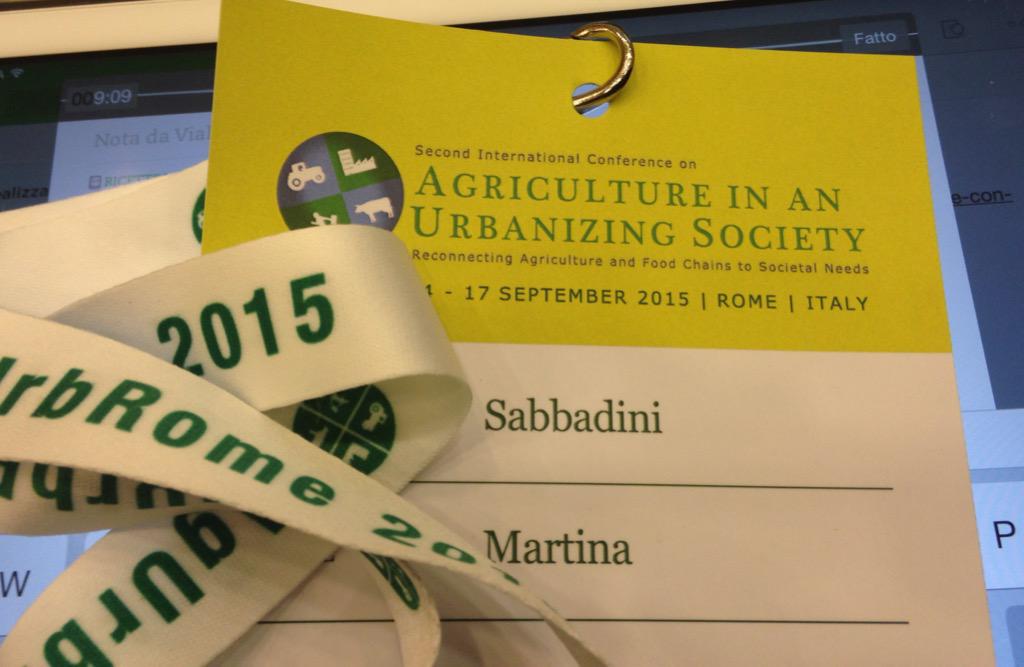14-17 September 2015. Rome, Italy. This conference aimed at advancing the scientific state of the art in research on multifunctional agriculture and urban-rural relations by bringing together scholars from a wide range of disciplines from many parts of the world. The 2015 edition will focus on reconnecting agriculture and food chains to societal needs.
Presentations related to Africa:
Extracts of the programme
Presentations related to Africa:
Extracts of the programme
- Navigating the Maize to the City, Marc Wegerif : The rapid urbanization of the world, with all its challenges and opportunities, is almost all taking place in the urban centres of the developing world. Tanzania’s largest city, Dar es Salaam, is a prime example. It has well over 4 million inhabitants, many in poverty, and is the 9th fastest growing urban centre in the world. This paper drawed on new primary research to show the patterns of provisioning that bring the key staple food of maize, largely from the rural hinterland, to eaters in the fast growing city of Dar es Salaam. It illustrates the patterns of provisioning through which a diverse range of actors are linking rural with urban and eater with producer.
- Institutional procurement of food from smallholder farmers: Legal issues and lessons learned from the Brazilian and P4P experiences, Luana Swensson. This paper aimed to analyse three main legal issues linked to Institutional food Procurement Programmes IPPs: (i) regulation of public procurement; (ii) development of a legal definition of smallholder or family farming producers at national level; and (iii) legal structure and regulation of smallholder producer organizations. It aims do it through the analysis of two key IPP experiences: (i) Brazil and its two IPPs - PAA and PNAE – and (ii) the WFP Purchase for Progress (P4P) initiative
- Marriage of convenience between farmer organizations and milk industry, for a more resilient local milk value chain in Niamey, Niger, Renard Olivier and Ouseini Ganda: Niamey, capital city of Niger, has a dynamic dairy processing sector due to traditional high milk consumption. It has three industrial units of dairy processing, and several other smaller units, using mostly imported milk powder. The development of a market for local milk requires both efforts in terms of collective action, due to the fragmentation of milk production and quality problems (debris, wetting), and investment in equipment, due to high perishability of the product. An IRAM project is currently supporting milk collection centers, allowing a reception and control of milk closer to producers, limiting transaction costs, ensuring quality control, and stabilizing supply downstream.
- Regional branding in West Africa: conciliating public and private initiatives, local and international market development - The case of Ziama-Macenta Robusta Coffee in Guinea Renard Olivier and Camara Kerfalla: Robusta Coffee is a major cash crop in Guinée Forestière for thousands of small scale farmers. Guinean coffee is not well-established on the international coffee market, due to its lower quality. Some producers in this area have broken the vicious circle of bad quality/ low prices to produce higher quality coffee, with specific characteristics linked to the origin. “Café Ziama-Macenta” Geographical Indication has been recognised in 2013 and is rewarding this effort. But the GI alone is not enough to guarantee success and the GI Association needs some support to promote its coffee and export to foreign markets. A project is currently supporting local cooperatives to support the GI dynamic, and obtain private certifications.
- The use of Urban Spatial Scenario Design Model (USSDM) in assessing the impact of urban growth on urban and Peri-urban agriculture: the case of Addis Ababa Ethiopia and the Surrounding towns, Hany Abo-El-Wafa and Stephan Pauleit: The productivity of major crops is estimated based on ratings of crop suitability with respect to individual land qualities, climatic and environmental conditions. Understanding the future patterns of expansion in Addis Ababa and assessing the effects of these patterns on the urban and peri-urban agriculture offers opportunities for identifying, protecting and restoring key elements in urban and peri-urban agriculture allowing for sustainable planning of urban growth.



No comments:
Post a Comment